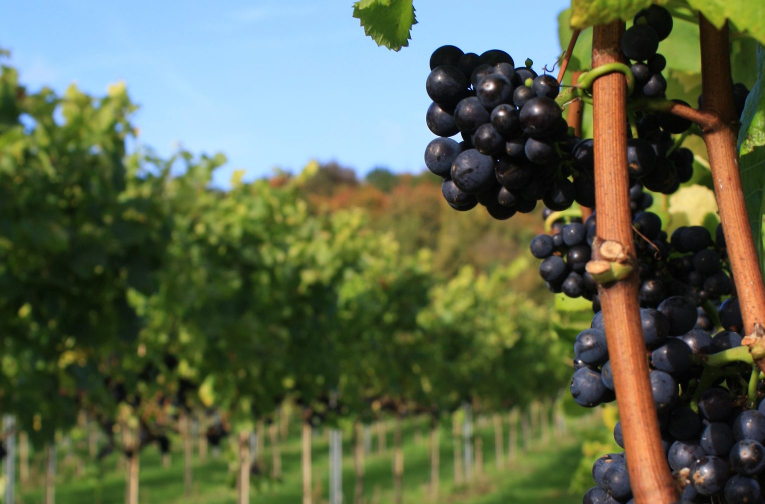Ed. note: This article first appeared on ARC2020.eu. ARC2020 is a platform for agri-food and rural actors working towards better food, farming, and rural policies for Europe.
Undaunted by the challenge of growing grapes in rainy England, the family-run Aldwick Estate turned to wine production as a way to improve soil health. Ursula Billington spoke to the wine growers about fungicides, inspiration from France, and the future of wine-making in the UK.
Wine-making could be seen as a bold venture in England’s famously soggy West Country, with grapes so notoriously prone to fungal disease. Yet it’s here that Aldwick Estate manages to produce their internationally award-winning wines – whilst improving the health of soil and environment as they go.
Under the charge of the Watts family for five generations to date, the 300-acre Estate has seen a number of different uses, incorporating viniculture for the first time in 2008, and focusing on practices that are enriching the land for generations to come.
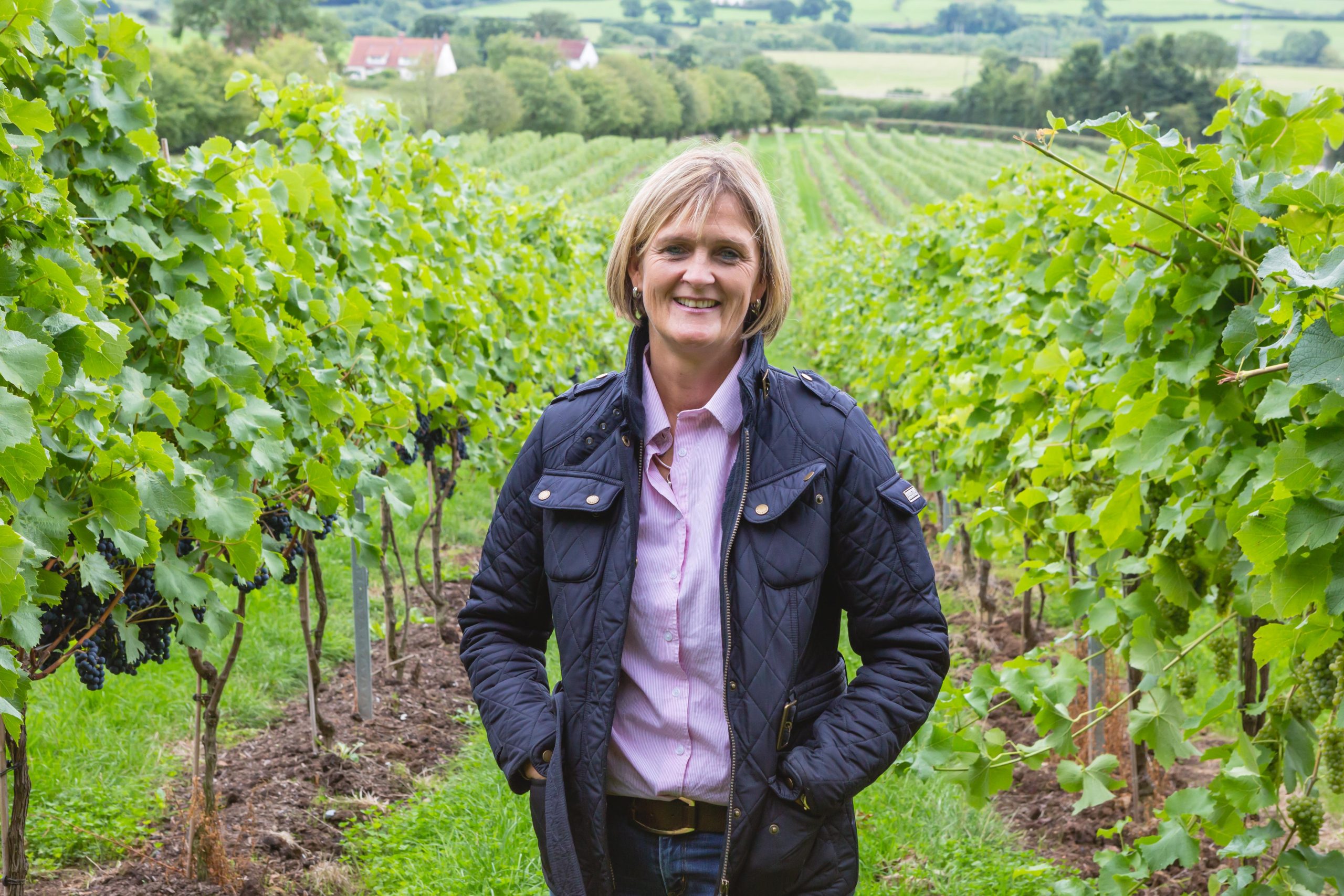
Sandy Luck, Owner and Managing Director at Aldwick Estate, in the vineyard she established. The Estate has been in her family for five generations. © Aldwick Estate
Bloom and boom: the state of sustainable wines in the UK
Despite the UK’s considerable consumption of the stuff, local conditions are not congenial to wine production: vineyards in England and Wales account for just 1% of the domestic market. A rapid increase in the last decade now puts England’s official vineyard count at 450, with production of 15.6m bottles per year.
Vineyards are normally located in southerly regions with warm, drier climates that make for higher sugar levels in the grapes; suitable for white and sparkling varieties which favour the chalky limestone of England’s East Coast counties such as Kent and Sussex – with soil and climate comparable to France’s Champagne region.
The rise in popularity of domestic wines has been attributed, largely, to a changing climate that includes our recent spate of hotter summers; and to the high rate of returns a farmer sees compared to standard crops.
But the most exciting explanation, by far, is the growth of interest in the local food movement. Consumers are actively choosing to reduce air miles and support local, in numbers significant enough to render homegrown wine production viable.
What difference does this make to the state and sustainability of Britain’s green and pleasant land?
According to the headlines organic wine is booming in the UK – sales are up a whopping 47% this year – yet the methodology accounts for only 3% of English vineyards, and only 1% are biodynamic.
This might not be altogether bad news. The heavy chemical application of conventional wine production is notoriously hard on soil health; whilst organic methods have become controversial for reliance on a similarly intense use of additives – notably copper which lingers in the ground, reducing soil fertility and harming wildlife, groundwater and farmers.
In the face of these challenges, many growers are adopting a more pragmatic philosophy that, rather than adhering strictly to specific labels, production should aim for environmental sustainability whilst working to achieve this in the best possible way for the local landscape.
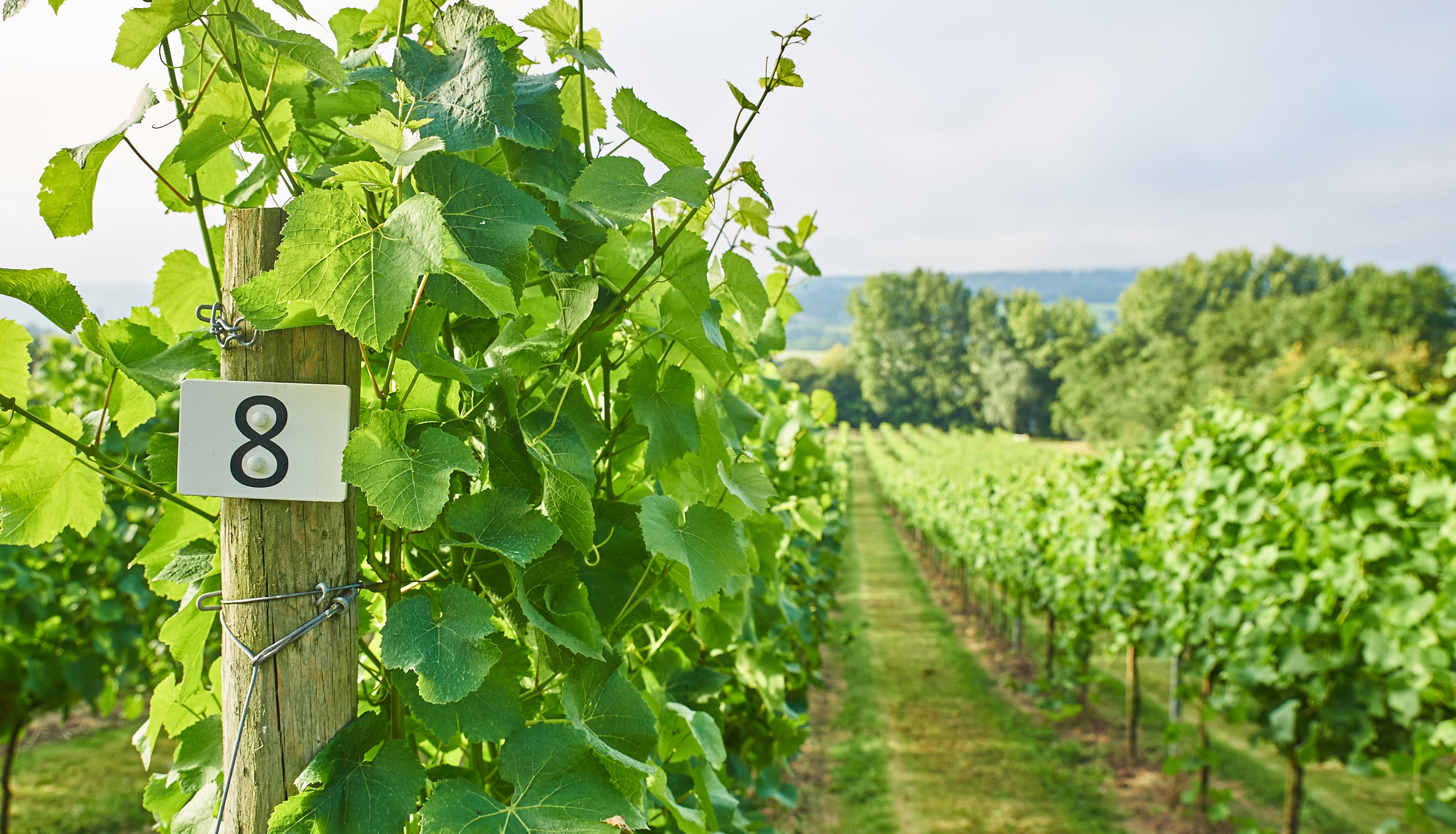
The Aldwick Estate introduced viniculture in 2008, with a focus on practices that will enrich the land for generations to come. © Aldwick Estate
Agroecology à la Aldwick
Nestled in the heart of North Somerset, Aldwick Estate comprises a sheep farm, events venue and 12 acres of established vineyard. It historically farmed dairy, then arable, then an intensive pig operation until 2012. This final use impacted heavily on the land, with feed additives killing off earthworms and microbial fauna. Removing the pigs and implementing sustainable land management, however, has improved the soil significantly and worm numbers are now back up.
Agroecological practices across the farm include rotational grazing, haylage production, closed-loop processes and diversification; vineyard management focuses on a well-rounded approach to sustainability with soil health as a foundation and a long-term view towards ecologically responsible wine production of the highest order.
Dave Morris joined Aldwick as vineyard manager in January 2020 following years of practice in biodynamic wine production. He recognises the Estate’s approach is more complex but feels the ethos matches his own in spirit, in that land management should reflect the needs of the landscape in the context of local geography and climate.
In Somerset, this means use of fungicides and herbicides but with an emphasis on long-term reduction and absolute minimisation – predicting the viable possibility of a spray programme that falls within the bounds of organic certification within the next few years. This relies on an improved soil structure which supports vine health to the point that susceptibility to disease is reduced. Healthy vines and reduced spraying regimes are a win-win for the land and the Estate: knock-on effects include increased soil microbiology, reduced compaction, less diesel use and lower farm costs.
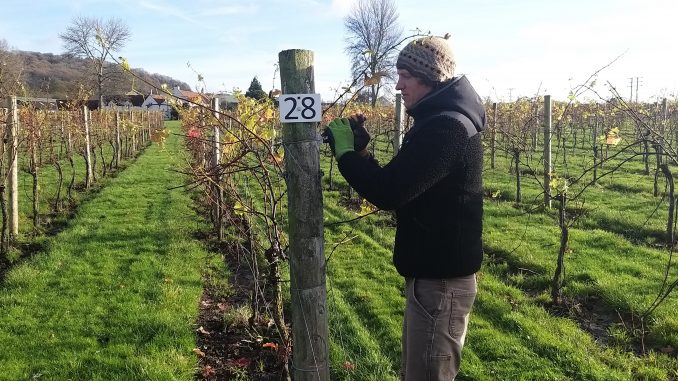
Vineyard manager Dave Morris at work © Aldwick Estate
Soil first
With these benefits in mind, a focus on soil improvements is absolutely key: “Soil health has always been a cornerstone of the approach here at Aldwick and remains of upmost importance,” says Dave.
This begins with a unique under-vine composting regime. The latest recipe is proportionally high in carbon to compensate for the site’s naturally high nitrogen content. It consists of mixed wastes from neighbouring farms to supplement the Estate’s own straw and hay waste from the stables, grape marc from the winery, wood chippings from the tree surgeon’s yard, grass clippings and shredded office paper. Dave is proud of this closed circuit of waste re-purposing “as aimed for in the most ambitious sustainable systems.”
Compost application aims to improve the vineyard’s heavy clay topsoil, increasing organic matter, biota, water storage and fertility – so as to supply all the vines’ nutritional needs without petrochemical-derived foliar feeds.
Dave has already seen benefits: “There’s been significant improvement in the water-holding capacity of the soil – less water-logging and hard setting in dry summer months. Building the vineyards from the soil up, we see incidental evidence year-on-year of greater diversity of plants and wildlife across the site.”
The better the soil, the easier it is to weed and the larger the weeding-window – meaning fewer passes with the mechanical weeder and reduced spraying without reduced efficacy.
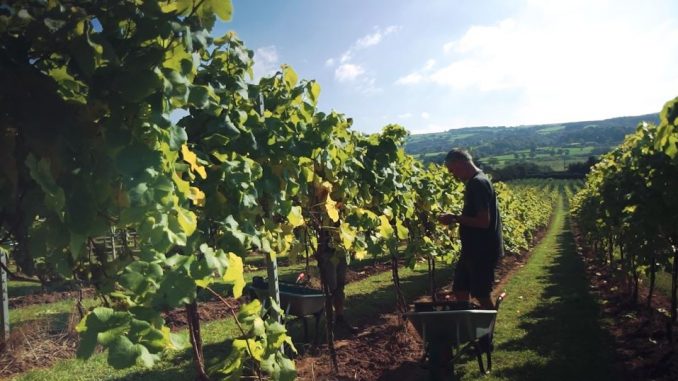
“Building the vineyards from the soil up, we see incidental evidence year-on-year of greater diversity of plants and wildlife across the site,” says vineyard manager Dave Morris. © Aldwick Estate
Spot spraying and sustainability
Dave likens the approach to the lutte raisonnée systems of France, focused on weed removal under vines to minimise disease pressure.
In Somerset, with rainfall and nitrogen plentiful, weeds appear continuously through the growing season meaning mechanical weeding is necessary; every effort is made to protect soil structure by limiting machine use, so spot spraying augments the weeding programme.
Purists might disapprove, but Dave reasons: “Spot spraying allows us to minimise tractor use, diesel consumption and many extra mechanical weeding passes without having to perform full blanket herbicide application. Not relying on one method allows us to be adaptable in timing and application of either one to optimum conditions.”
This approach, says Dave, is key to achieving many goals of the Estate, including long-term sustainability: “Where little or no synthetic chemicals are used for disease control, as in biodynamics, focus must be on the highest quality cultural practices – maximising airflow and sunlight through the canopy – aided by natural plant and mineral sprays. This invariably means smaller crops and higher prices.”
Aldwick use the same high-quality cultural techniques, but with support from minimal applications of synthetic fungicides that are well timed, carefully planned and adaptive to reflect conditions and disease pressure.
Chemical intervention is further restricted by use of homemade compost and willow teas: “This allows us to achieve another really important thread of sustainability – producing very good yields of high-quality grapes at less cost than a biodynamic or organic system, which is reflected in the final price of the wine.”

Raise a glass to a rosé future: With the UK’s new agriculture bill and an ecologically minded younger generation of wine growers, the future looks bright for sustainable British wines. © Aldwick Estate
Fresh start
Dave is optimistic about Aldwick’s future – and cautiously hopeful for the domestic industry in light of new environment-centred agricultural policy.
“It’s difficult to say until the detail is filled in between now and 2024, but the focus on soil seems to show a new way of thinking from Government,” he notes. “Hopefully the ideals of rewarding those who are putting more into the land, improving soil health and ecology whilst maintaining productivity, are put into legislation. Our approach fits very well with those ideals.”
He suggests related financial incentives could have beneficial repercussions such as access to better machinery, reducing land impacts and emissions. For the industry as a whole: “I hope and believe that many producers will begin or have started farming their land in a more ecological way that best reflects the specifics of their site and circumstances. A dynamic government policy such as ELM can only accelerate that.”
A newly-established national scheme, Sustainable Wines of Great Britain, aims to minimise the sector’s impact on the environment and support its contribution to conservation and biodiversity. Membership already constitutes 40% of domestic wine production.
The youth of the UK wine industry could actually work in its favour, muses Dave: “Lack of history makes it easier to start out on a better path ecologically than many other wine-growing regions find themselves. I hope viticulture continues to grow as a responsible, ecologically-sound type of farming.”
There could be opportunities, too, in marginal land unsuited to food production: “I hope there’ll be a greater move towards using these sites for wine – as is the norm in traditional grape-growing countries. If Government policy could incentivise this, it could be beneficial to everyone.”
Teaser photo credit: © Aldwick Estate


